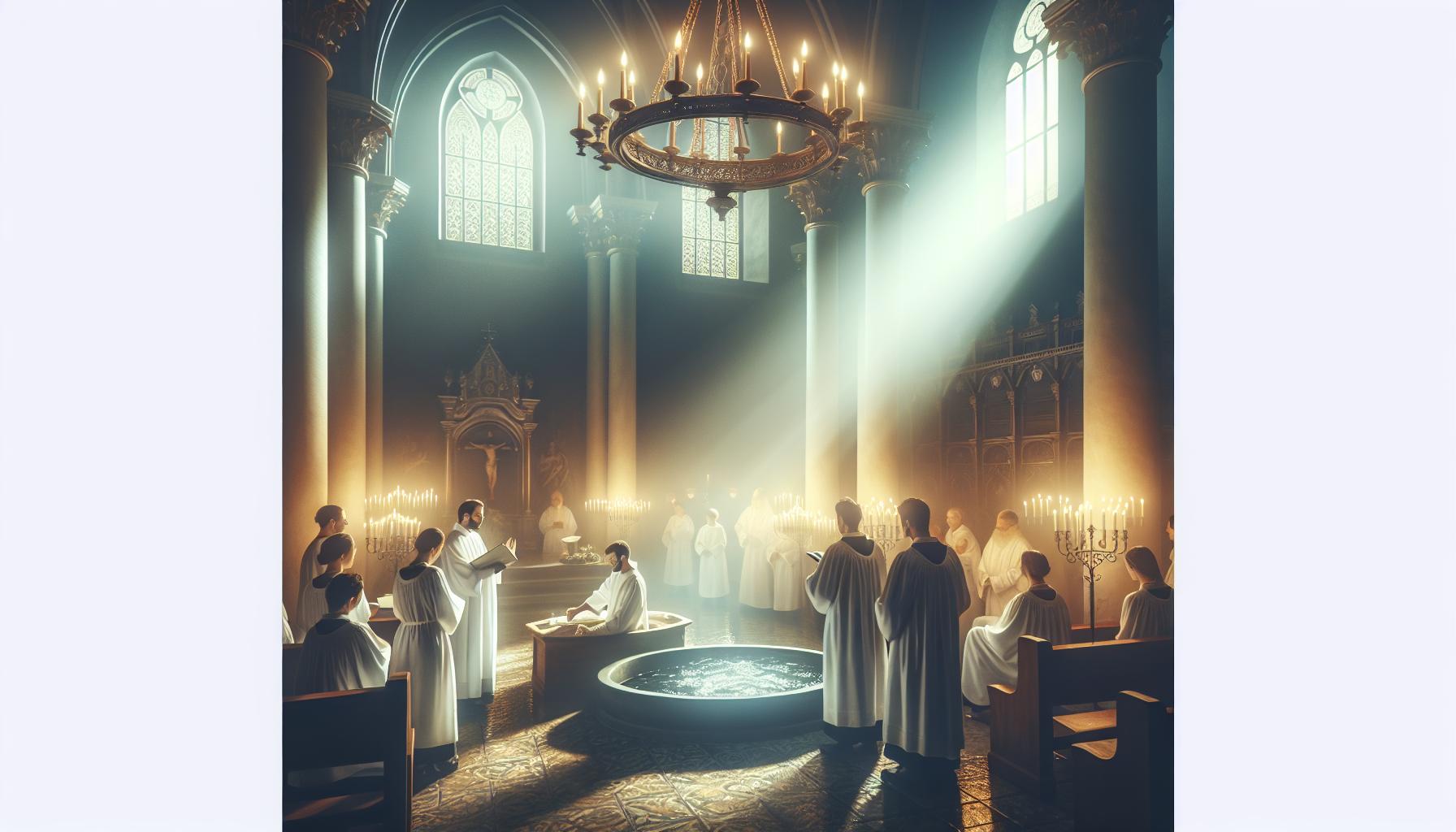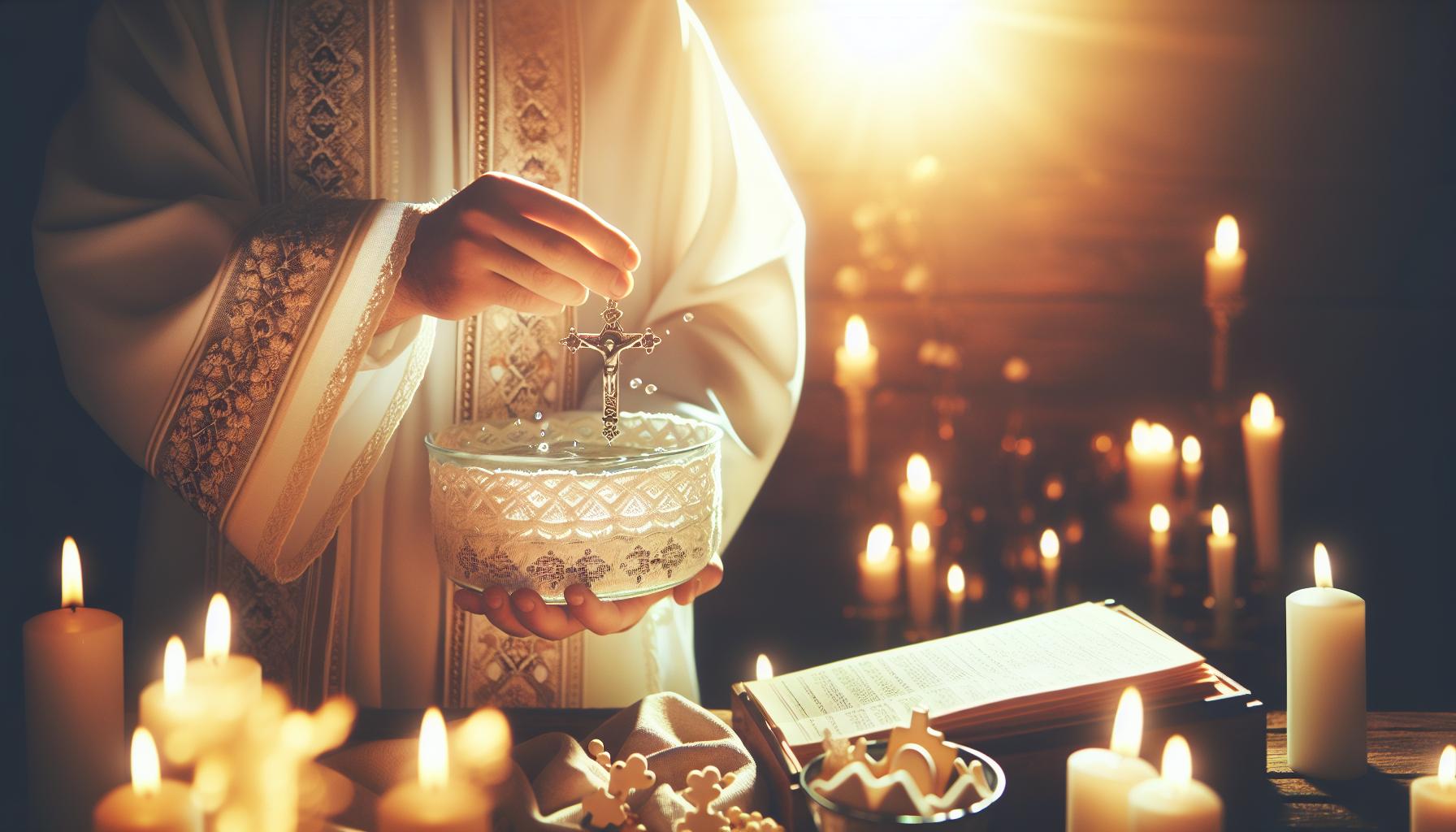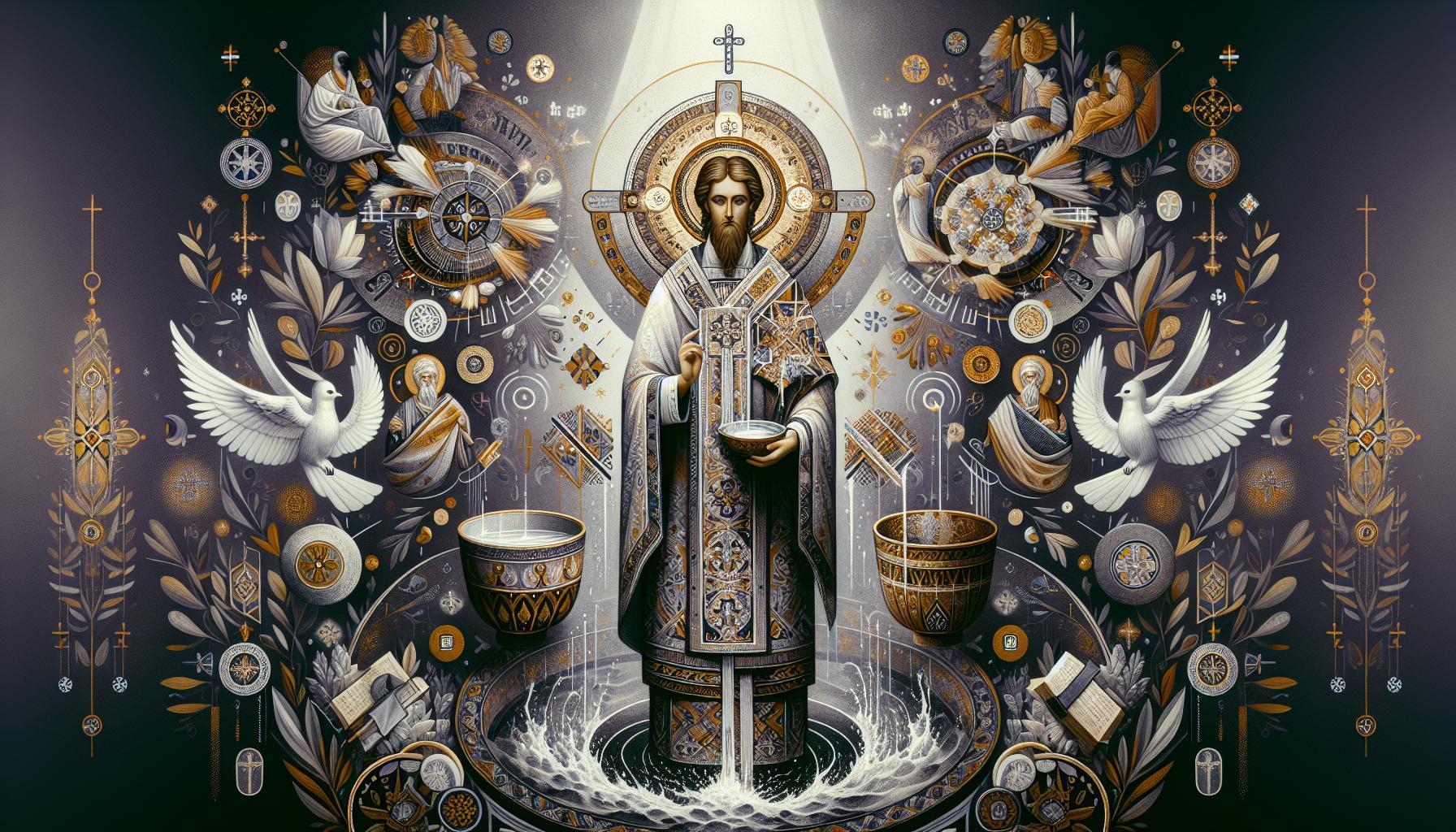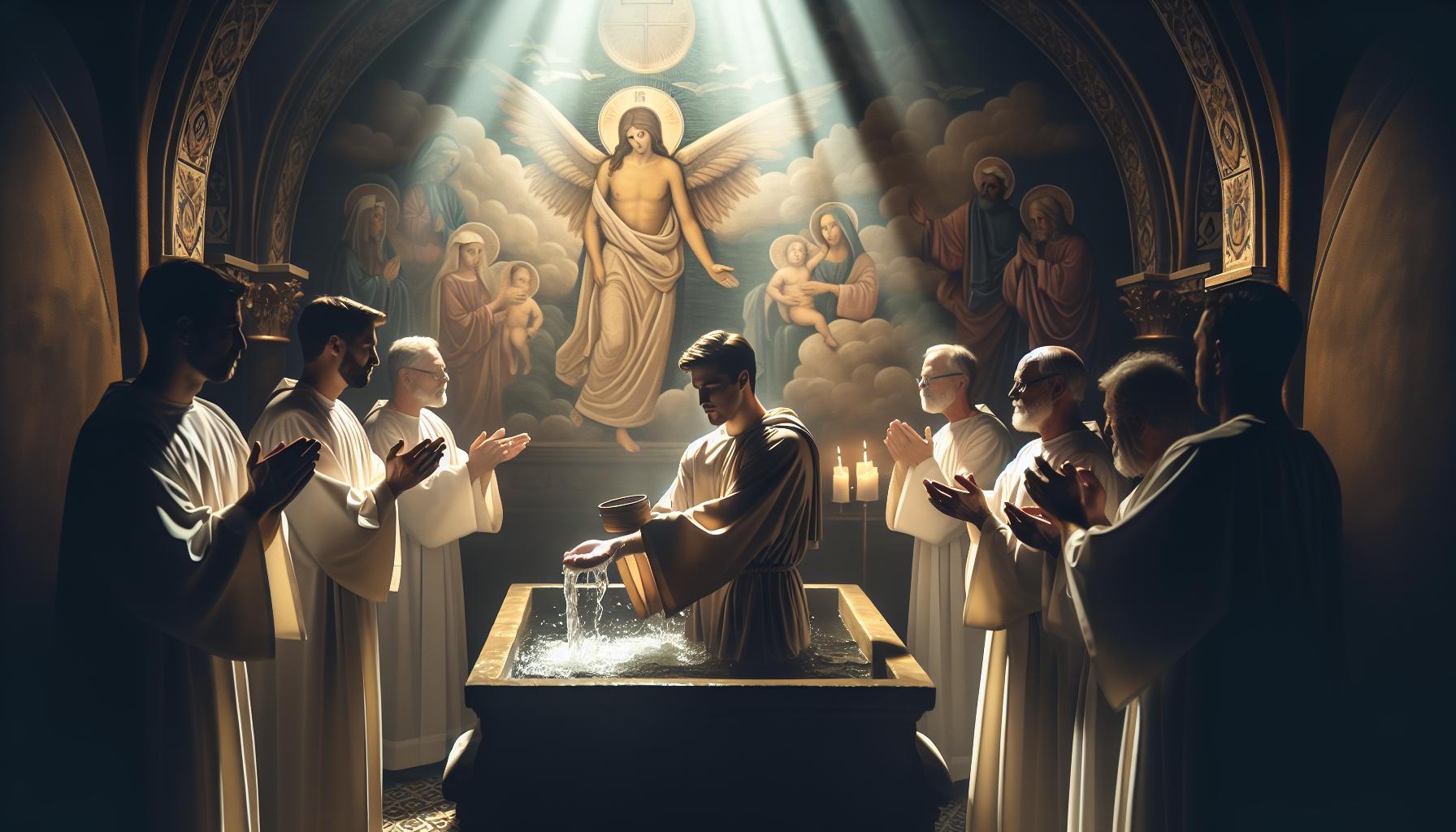When it comes to baptisms, the question of whether to give gifts often causes confusion among guests. Understanding the etiquette and traditions surrounding baptism gifts is essential for honoring this significant occasion. In this article, we clarify what’s appropriate to give, ensuring you navigate this sacred event with grace and thoughtfulness.
Understanding the Significance of Baptism in Various Traditions
Baptism is often hailed as a pivotal rite of passage across various cultures and religious traditions, symbolizing a spiritual awakening or a commitment to faith. This sacred act not only serves as an initiation into a religious community but also as a deeply personal and communal event that unites families and congregations. Understanding the significance of baptism in its diverse forms can illuminate the various customs, such as gift-giving, that accompany this sacred ceremony.
The Different Practices of Baptism
In Christianity, baptism is primarily seen as an expression of faith. For many denominations, it is a sacrament that signifies the washing away of sin and the individual’s entry into the faith. This is evident through the practice of infant baptism, prevalent in Roman Catholic and Orthodox traditions, where the child is baptized to cleanse original sin, surrounded by family and godparents. Conversely, many Protestant denominations endorse *believer’s baptism*, where individuals choose to be baptized upon declaring their faith, reflecting personal conviction rather than family lineage.
In non-Christian traditions, baptism may manifest as similar rites or ceremonies symbolizing purification or initiation. For instance, many Indigenous cultures include water rituals as a means to honor life transitions or welcome new members into the community. Each tradition provides a unique perspective on the importance of water, symbolizing rebirth and transformation, highlighting that regardless of the specific faith, the concept of baptism is universal in its intent to mark significant life changes.
Gifts and Traditions in Baptism
Understanding the etiquette surrounding gift-giving in baptism can vary widely depending on cultural and religious norms. In many Christian communities, it is customary to present gifts to the baptized individual, which often include:
- Religious Items: Crosses, Bibles, or prayer books that hold religious significance.
- Jewelry: Personalized items like a silver cross pendant or a charm bracelet, often engraved with the date of the baptism.
- Clothing: Special baptism outfits or custom-made garments that the child can wear during the ceremony.
Although the act of gift-giving can sometimes feel overwhelming, it’s essential to align your choice with the family’s values and the specific faith practices associated with the baptism. Engaging with the parents about their preferences can ensure that your gift is meaningful and resonates with the significance of this sacred occasion.
| Religious Tradition | Common Gifts | Gift Etiquette |
|---|---|---|
| Roman Catholic | Cross necklaces, rosaries, children’s bibles | Typically, gifts are presented during the ceremony or following it during a reception. |
| Protestant | Books, toys, personalized items | Gifts may vary; they are often sent after the event if not given in person. |
| Orthodox | Gold crosses, icons, and religious books | Gift-giving is welcomed, often following the traditional celebration meal. |
By appreciating the deeper meanings behind the baptismal practices across various traditions and recognizing the significance of your participation through thoughtful gifting, you contribute to the spiritual journey of the individual being baptized while aligning your actions with the customs outlined in “Do You Give Gifts for Baptism: Etiquette & Traditions Explained.” This understanding not only enriches the experience but also fosters a sense of community and shared faith among all participants.
Should You Give a Gift for a Baptism? The Etiquette Breakdown
When attending a baptism, the question often arises: is it appropriate to give a gift? A baptism is not just a religious ceremony; it symbolizes a significant milestone in one’s spiritual journey. Many families view this event as an occasion to celebrate the introduction of a child into their faith community, making it a suitable moment for gift-giving. Understanding the nuances of this tradition can enhance your experience and connection to the ceremony.
The Role of Gifts in Baptism
In many cultures, presenting a gift during baptism is not just a nice gesture; it’s a tradition deeply rooted in history. Gifts are often given as tokens of goodwill and to express the hope for spiritual prosperity in the child’s life. However, the expectation of gifts can vary based on cultural backgrounds, personal beliefs, and the nature of the ceremony. Here are some common reasons for giving a baptism gift:
- Symbolism: Gifts often symbolize faith, protection, and guidance in the child’s spiritual life.
- Support: It shows support for the parents as they embark on the journey of raising their child in the faith.
- Celebration: Gifts add to the celebration of the milestone being honored, enhancing the festive atmosphere.
What Do You Give?
Choosing an appropriate baptism gift can sometimes be a challenge, but certain items are traditionally favored. Here’s a quick overview:
| Gift Type | Description |
|---|---|
| Religious Items | Such as a cross necklace, Bible, or prayer book to foster spiritual growth. |
| Personalized Gifts | Items like monogrammed blankets or engraved keepsakes make unique mementos. |
| Clothing | A beautiful outfit for the child to wear during the ceremony, often cherished for years. |
| Money or Savings Bonds | A practical gift that contributes to the child’s future and education. |
While gifts are considered thoughtful, it’s essential to be aware of the preferences of the family hosting the baptism. Some may explicitly state a desire for no gifts, favoring donations to a charity or offering the gift of your presence. Always best practice dictates you check with the parents or guardians when in doubt.
In essence, while the act of gift-giving at a baptism is widely embraced and encouraged, it is vital to approach it with sensitivity, ensuring it aligns with the family’s traditions and wishes. This thoughtful consideration not only respects the essence of the event but also strengthens your bond with those involved.
Thoughtful Gift Ideas for Baptism: Honoring the Occasion
Celebrating a baptism is a momentous occasion that holds deep significance in many cultures and religions. It symbolizes new beginnings, purification, and the reception of grace. Gift-giving is a cherished tradition associated with this event, serving not only as a way to honor the child but also to support the family during this spiritually enriching time. Choosing the perfect gift can enhance the joyful atmosphere of the ceremony and leave a lasting impression.
When considering thoughtful gift ideas for a baptism, there are numerous options that combine tradition with personal sentiment. Some timeless choices include:
- Personalized Keepsakes: Items such as engraved jewelry, custom picture frames, or monogrammed blankets can provide a lasting memory of the special day.
- Religious Symbolism: Gifts like baptism crosses, angel figurines, or decorative prayer books embody the spiritual significance of the occasion.
- Practical Gifts: Consider items that parents can use, like beautiful baby blankets or clothing suitable for the ceremony. These gifts blend utility with sentiment.
- Memory-Making Gifts: A photo album or scrapbook can be a wonderful way for families to document the milestones of the child’s early life, starting with their baptism.
Unique Gifts That Stand Out
While traditional gifts are always appreciated, you may want to consider more unique options that make your present memorable. For instance, a personalized storybook that features the child’s name can foster a lifelong love of reading. Alternatively, a donation in the child’s name to a charity can instill values of kindness and generosity from an early age.
Moreover, practical items like handmade quilts or family heirloom items passed down through generations suggest thoughtfulness and care, creating an emotional connection to the family’s history.
Finding the Perfect Gift
When selecting a baptism gift, remember to think about the family’s values and traditions. If they are religious, a meaningful spiritual item may resonate deeply. Consult with close family members or friends about what the parents may already have or need, to avoid duplicates and ensure your gift will be cherished.
Whether you choose a classic, personalized, or unique gift, the essence of your present should reflect the love and support you wish to convey to the family as they embark on this beautiful journey with their child. With so many thoughtful options available, you can contribute to the joyous celebration in a way that honors the occasion and the family’s beliefs.
Traditional Versus Modern Gifts: What’s Appropriate for Today’s Baptism?
When it comes to gift-giving for a baptism, the choices available today reflect a delightful blend of tradition and modernity. Understanding the nuances of selecting the perfect gift can not only showcase your thoughtfulness but also your respect for the significance of the occasion. Baptism marks an important spiritual milestone, and your gift can symbolize support and blessing for the child’s journey through faith.
### Traditional Gifts
Traditionally, gift-giving for baptisms has revolved around items that hold significant spiritual or sentimental value. These may include:
- Religious Items: Keepsakes like crosses, rosaries, or prayer books make for timeless gifts.
- Personalized Gifts: Engraved items, such as silver spoons or baby cups, have sentimental value that can be cherished for years.
- Family Heirlooms: Some families may pass down cherished items that have been gifting across generations, adding a personal touch to the occasion.
These gifts emphasize the spiritual nature of the baptism and the important role of faith in the child’s life.
### Modern Gifts
Today, modern interpretations of baptism gifts offer more flexibility and creativity. Here are some popular contemporary options:
- Books: Consider beautifully illustrated children’s books about faith or stories with moral lessons.
- Experiences: Offering a gift certificate for a family outing can create lasting memories, turning the emphasis from material objects to quality time together.
- Charitable Donations: Making a donation in the child’s name to a charity resonates well with many parents who value social responsibility.
- Personalized Digital Gifts: Think personalized online subscriptions or educational programs that align with the family’s interests.
Both traditional and modern gifts serve unique purposes and reflect the values of the families involved.
| Aspect | Traditional Gifts | Modern Gifts |
|---|---|---|
| Sentiment | Sentimental and spiritual | Creative and experiential |
| Value | Long-lasting and meaningful | Focus on experiences or values |
| Personal Touch | Often personalized or engraved | May revolve around experiences or donations |
In summary, the appropriate gift for a baptism often depends on the preferences of the parents and the significance they place on the occasion. Whether you choose a classic gift that underscores the spiritual essence of the baptism or opt for a modern gesture that emphasizes experiences and personal growth, what matters most is the thoughtfulness behind your selection and the support you are extending to the family as they embark on this meaningful journey.
The Role of Godparents: Gift Expectations and Responsibilities
The role of godparents in a child’s life extends far beyond the baptism ceremony, intertwining spiritual guidance with personal responsibility. Traditionally, godparents are chosen not just for their close family ties or friendship with the parents, but for their willingness to take on an active role in nurturing the child’s moral and spiritual growth. They are seen as mentors, guardians, and, in many cases, a second set of parents, a promise that is both significant and rewarding.
Understanding Expectations
Within the context of baptism, the expectations of godparents can vary significantly based on cultural and religious backgrounds. However, there are common responsibilities that generally apply:
- Spiritual Guidance: Godparents are expected to provide spiritual support, helping the child understand their faith as they grow. This may include attending religious services together or discussing values and beliefs.
- Emotional Support: Beyond spiritual nurturing, being a sounding board during challenging times is a key component of the godparent’s role. They should be accessible and supportive throughout the child’s life.
- Celebratory Participation: Many families expect godparents to be part of significant life events, such as birthdays, confirmations, and other milestone celebrations, reinforcing the bond they share with the child.
- Financial Contributions: It is also common for godparents to contribute financially to things like baptism gifts or celebrations, though this should be approached with sensitivity. They may also be involved in gifting to support the child’s future education or personal development.
Gift-Giving Traditions
When it comes to the baptism ceremony itself, gift-giving can play an integral role in expressing the godparent’s commitment. Typically, the gift from the godparent might include spiritual items, such as a personalized Bible, a cross necklace, or other religious artifacts that hold significant meaning. The expectation is not just about the monetary value but rather the thoughtfulness and intention behind the gift.
Here’s a quick overview of popular gift ideas tailored for godparents to consider:
| Gift Type | Description |
|---|---|
| Baptismal Cross | A decorative or wearable cross that symbolizes faith. |
| Personalized Bible | A children’s Bible with the child’s name engraved for a personal touch. |
| Customized Blanket | A soft blanket with emotional messages or symbols of faith stitched in. |
| Memory Book | A book where significant moments in the child’s life can be recorded and cherished. |
Selecting a meaningful gift can serve as a lasting reminder of the godparents’ commitment, contributing to the child’s spiritual journey while also establishing a close and loving relationship throughout their lives. A thoughtful gift can not only signify the occasion of baptism but also the ongoing support and presence of the godparent in the child’s life, embodying the spirit of the traditions explored in “Do You Give Gifts for Baptism: Etiquette & Traditions Explained.”
Cultural Variations in Baptism Gift Giving: A Global Perspective
Across the globe, the sacred act of baptism is often accompanied by a rich tapestry of customs and traditions, including gift-giving. Understanding these cultural variations not only enhances the experience but also strengthens the bonds of community and family during this significant rite of passage. The question of whether to give gifts for baptism—and what those gifts should be—is approached quite differently depending on local customs and traditions.
Western Perspectives
In many Western cultures, attending a baptism typically involves bringing a gift, communicating support and love for the child and family. Common gifts may include:
- Religious Items: Items such as rosaries, Bibles, and crucifixes are popular, reflecting the spiritual significance of the ceremony.
- Personalized Gifts: Engraved frames or keepsake boxes often serve as lasting mementos.
- Cash Gifts: Monetary gifts are customary in some families, allowing parents to use the funds for future needs.
In these contexts, the act of giving a gift symbolizes not only a personal connection but also an acknowledgment of the child’s spiritual journey.
Eastern Traditions
In Eastern cultures, particularly within Orthodox or Eastern Catholic communities, the approach to baptism gifts can differ significantly. Here, the focus may be less on tangible items and more on spiritual blessings. For instance:
- Gifts of Faith: Rather than physical gifts, attendees may offer prayers, blessings, or even the promise of mentorship as the child grows in faith.
- Charitable Donations: Some families might prefer donations made in the child’s name to charity or community funds, emphasizing communal support over personal gifts.
This perspective highlights a distinct value placed on community and spirituality over materialism.
Global Practices
Around the world, the nuances of gift-giving for baptisms vary significantly, influenced by historical, religious, and social factors. The following table illustrates some cultural practices regarding baptism gift-giving traditions across different regions:
| Region | Common Gifts | Gift-Giving Customs |
|---|---|---|
| North America | Religious symbols, cash | Friends and family typically give gifts; emphasis on personal items. |
| Latin America | Bracelets, religious medals | Celebratory gatherings often accompany gift exchanges. |
| Middle East | Charity donations, traditional sweets | Focus on community events; emotional support stressed over material gifts. |
| Asia (various cultures) | Gold items (jewelry), education funds | Familial duty to support; gifts often showcased at large family gatherings. |
By recognizing these differences, attendees can engage more thoughtfully with the families being honored during the baptism ceremony. Ultimately, understanding cultural variations in baptism gift-giving enriches the experience for everyone involved, reflecting the diverse expressions of faith and community across the globe.
Timing and Presentation: How to Deliver Your Baptism Gift with Grace
The moment of baptism is a significant occasion, not just for the individual being baptized but for their family and community as well. When it comes to gifting, timing, and presentation play crucial roles in conveying your blessings and intentions. Understanding the nuances of etiquette surrounding baptism gifts ensures that your gesture is received with the warmth it deserves.
Choosing the Right Moment
When planning to deliver a baptism gift, consider the timing of the event. Many families celebrate this occasion with a special ceremony followed by a reception or gathering. It’s courteous to present your gift during this celebration; this timing enhances the emotional resonance of the gesture. However, if you’re unable to attend the baptism, sending your gift beforehand or soon after is also acceptable, as it shows you are thinking of them even in your absence.
Thoughtful Presentation
The way you present your baptism gift can elevate your thoughtfulness even further. Here are some presentation tips to ensure your gift reflects your care and attention:
- Wrap It Beautifully: Use decorative paper or a gift bag that matches the occasion’s theme. Soft colors like white, pastel blue, or pink often align beautifully with baptism themes.
- Add a Personal Note: Include a heartfelt card expressing your wishes for the baptized individual. A personalized message not only conveys your intentions but also adds sentimental value to your gift.
- Consider a Symbolic Element: Incorporate symbols of faith or love into your gift wrapping, such as ribbons featuring crosses or themes related to the individual’s faith.
Practical Examples of Gift Giving
Having a clear idea about when and how to present your gift makes the process seamless. For instance, if you have chosen a religious keepsake, such as a personalized Bible or a charm bracelet, presenting it during the post-ceremony gathering creates a special moment for everyone involved. Below is a table showcasing various popular baptism gifts along with recommended presentation methods:
| Gift Type | Presentation Tip |
|---|---|
| Personalized Bible | Wrap in a silk cloth and tie with a ribbon. |
| Sterling Silver Cross Pendant | Place in a small decorative box, topped with a flower. |
| Customized Blanket | Pack in a woven basket, adding a small stuffed animal. |
| Faith-based Storybook | Use themed gift wrap, accompanied by a handwritten note. |
Being mindful of both the timing and presentation of your baptism gift ensures that it resonates deeply with the family while respecting etiquette and traditions. Engaging with this rite of passage thoughtfully and artfully not only honors the individual but enriches the community that surrounds them.
Embracing Inclusivity: Gifts for Interfaith Baptisms and Celebrations
Navigating the world of gifts during baptism ceremonies—especially in interfaith contexts—can be a rewarding experience that goes beyond mere tradition. These sacred milestones not only mark an individual’s spiritual journey but also offer a chance to celebrate diverse beliefs and values. As questions around “Do you give gifts for baptism?” arise, the answer is a resounding yes, particularly when it comes to interfaith settings where inclusivity and understanding take center stage.
Thoughtful Gift Ideas for Interfaith Baptisms
Choosing a gift for an interfaith baptism should reflect the essence of the occasion and accommodate various beliefs. Consider the following options that resonate with spirituality and inclusivity:
- Personalized Keepsakes: Engraved items such as a cross, a Star of David, or other meaningful symbols can be cherished reminders of the day.
- Storybooks on Diverse Beliefs: Books that explore different faith traditions can help build understanding among young children and their families.
- Charitable Donations: Making a donation to a charity chosen by the child’s family highlights the spirit of giving and is a touching way to honor the baptism.
- Handmade Gifts: Crafting something unique, like a quilt or a piece of artwork that represents love and unity, adds a personal touch to your offering.
Respecting Traditions While Celebrating Diversity
It’s crucial to respect the cultural and religious backgrounds when selecting a baptism gift. Here are some tips to ensure your gesture is meaningful and well-received:
- Consult with Family: Speak to the parents about the significance of the baptism within their faith and ask about any specific customs or preferences they might have regarding gifts.
- Be Mindful of Symbols: While certain symbols may hold deep meanings in one religion, they can be perceived differently in another. Strive for universally positive representations of love and hope.
- Include a Personal Note: A heartfelt card expressing your thoughts about the ceremony and the child can elevate your gift, making it more special.
| Gift Idea | Why It’s Thoughtful |
|---|---|
| Engraved Jewelry | A lasting treasure that signifies faith and love. |
| Cultural Books | Encourages understanding and acceptance of different faiths. |
| Donation to a Cause | Embodies the spirit of generosity and community support. |
| Custom Art | Reflects your personal thoughtfulness and creativity. |
By thoughtfully selecting gifts for interfaith baptisms, you’re not just adhering to the question of “Do you give gifts for baptism?” but also actively participating in honoring the beauty of diversity and celebration. In doing so, you create an atmosphere of love and acceptance, reinforcing connections among varied faith traditions and families.
Faq
Do You Give Gifts for Baptism?
Yes, it is common to give gifts for baptism as a gesture of love and support. These gifts often symbolize the spiritual journey of the baptized individual and serve as cherished keepsakes.
Whether you’re attending a baptism for a child or an adult, such gifts can include items like personalized keepsakes, religious symbols, or even monetary gifts. They are a way to honor the significance of the baptism ceremony and to support the person’s faith journey. For more details on meaningful gifts, check our article on meaningful baptism gifts.
What is the etiquette for giving baptism gifts?
Baptism gift etiquette includes considering the recipient’s values and the relationship you have with them. It’s generally best to give a gift that is thoughtful and aligns with the ceremony’s spirit.
If you’re close to the family, a more personal gift can be appreciated, such as a family Bible or a custom piece of jewelry. Remember to include a card expressing your best wishes, which adds a personal touch to your gift.
Why do people give gifts for baptism?
People give gifts for baptism as a tradition to celebrate a significant spiritual milestone. Baptism signifies a new beginning in the individual’s faith life, making it an occasion worth honoring.
The act of gift-giving reflects communal support and encouragement. It also serves as a reminder of the spiritual commitment individuals make during baptism. Gifts can help reinforce this bond between the community and the newly baptized.
Can I give cash as a baptism gift?
Yes, giving cash is generally acceptable as a baptism gift, especially if it aligns with the family’s wishes. Cash gifts can provide flexibility for the recipient to use as needed.
However, it’s thoughtful to accompany a cash gift with a note expressing your good wishes. This reminder of your presence and support during this momentous occasion keeps the sentiment personal.
What types of gifts are common for adult baptisms?
Common gifts for adult baptisms often include items that facilitate their spiritual growth. Options might range from Bibles to faith-based books or devotionals.
Some people also choose to give practical items, like personalized journals for recording their faith journeys. These gifts underscore the adult’s commitment to their new faith life and help them deepen their spiritual practices.
Should baptism gifts be religious?
While many choose to give religious gifts, it’s not strictly necessary. Gifts can range widely in theme and should reflect the preferences of the recipient and their family.
For instance, a sentimental gift, like a custom piece of artwork, may also be appropriate if it carries personal significance. Ultimately, the key is to provide a gift that respects the occasion while resonating with the recipient’s taste and faith.
What should I avoid when choosing baptism gifts?
Avoid choosing gifts that might seem inappropriate or too personal, such as clothing items or gifts not aligned with the family’s beliefs. It’s essential to be considerate of the spiritual significance of the baptism when selecting your gift.
Also, steer clear of gifts that may imply criticism, such as items reflecting differing religious beliefs unless you know the family welcomes such diversity. Keeping the focus on the celebration and spiritual meaning of the event will help you choose wisely.
Final Thoughts
In conclusion, navigating the etiquette and traditions surrounding baptism gifts can be both enlightening and rewarding. As we’ve explored, these gestures go beyond mere obligation; they embody respect, love, and the sacred commitment parents and godparents make within their faith communities. Whether you choose to give a personalized keepsake, a meaningful book, or a charitable contribution in honor of the occasion, your choice can reflect the values and beliefs you hold dear.
We invite you to delve deeper into this rich tradition, considering the unique significance baptism holds in various denominations. Each gift can serve as a reminder of the sacred commitment made during this profound moment. As you engage with your own community, remember that the essence of gift-giving is an expression of joy and support for the spiritual journey ahead.
We encourage you to reflect on these practices and perhaps share your own experiences or insights. How do you celebrate this special milestone in your community? Your stories can inspire others and enrich our collective understanding. Thank you for exploring the beautiful interplay of faith, tradition, and generosity in the context of baptism.





